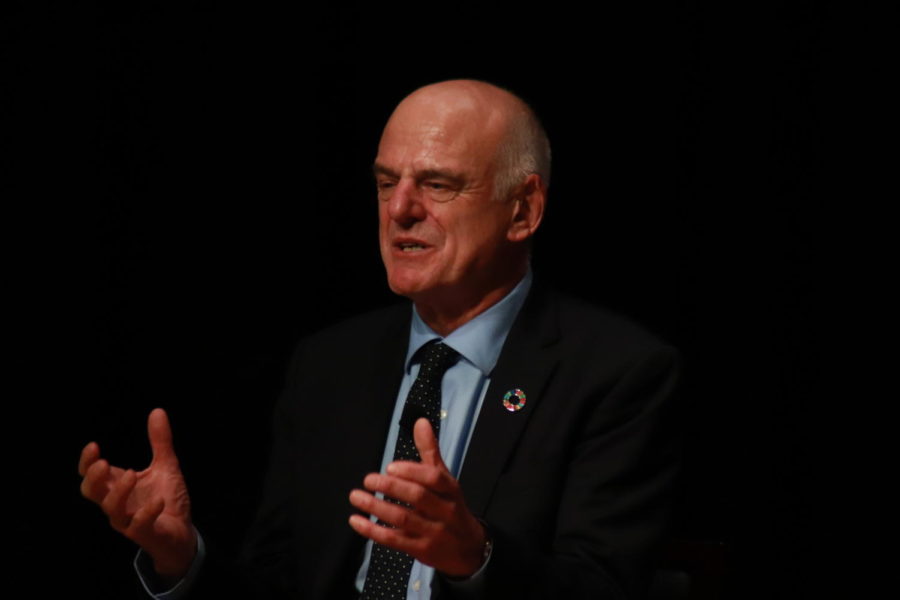World Food Prize Laureates discuss importance of proper nutrition
David Nabarro, retired United Nations High Level Task Force on Global Food Security, visits Iowa State University and discusses sustainability on food resources. Nabarro explains “Start to think like a systems thinker, rather than a linear thinker, because problems don’t come from one place, it’s multiple perspecitives and origins.” in the Great Hall at the Memorial Union on Oct. 15. “Everyone looks at a problem at a different perspective” Nabarro states.
October 15, 2018
Lawrence Haddad and David Nabarro, the 2018 World Food Prize Laureates, spoke about why nutrition should be a global priority Monday in the Great Hall of the Memorial Union. Wendy Wintersteen, Iowa State’s president, moderated the conversation.
Haddad and Nabarro’s lecture, “Why Good Nutrition should be a Global Priority and How to make it happen,” was the 17th Norman Borlaug lecture.
The lecture was named after Norman Borlaug, whose international work in wheat research and production earned him the Nobel Peace Prize in 1970.
Borlaug founded the World Food Prize which recognizes individuals’ achievements who help improve the quality, quantity and availability of food in the world and further improving human development annually, according to the lectures program website.
Haddad said there are 800 million people in the world who are hungry, which is equivalent to 1 in 7 people. He also said that 1 in 3 people are not getting the correct food. The first step in solving this, Haddad said, is convincing people their diets need to change.
“People don’t just get sick because of bacteria or viruses getting into their bodies, they’re often also getting sick because of the environments in which they live,” Nabarro said.
Haddad said in every country in the world, diet is amoung the top five or six factors for the cause of disease. Every country has a problem with its diet impacting its health, and every country can contribute to the solution, he said.
The next step is figuring out how to get the countries to work together, learn together, sit down and figure out how these problems are going to be solved, Haddad said.
Convincing policy makers that nutrition is a huge priority is Haddad’s main focus. He does extensive research and reaches out to officials to convince them of the importance of proper nutrition.
Haddad said obesity, not getting enough nutrition, diabetes and cancer, are all rooted in poor diet. One of the key steps in order to solve this is to convince policymakers that hunger is an issue, and by properly nourishing the world, we will address all of those terms.
Nabarro’s work is aimed at the policy makers who are already convinced proper nutrition is a worldwide issue. Nabarro is working to get food companies to take into consideration the manufacturing and marketing of food that is actually nutritious and sustainable.
Nabarro’s goal is for companies to not see this as a way to make a lot of money, but to help decrease hunger and increase nutrition for every person on the planet.
“You’ve got to be brave, you’ve got to have courage to get out of the comfort zone because that’s where the magic happens. Outside the comfort zone,” Haddad said.
Haddad and Nabarro engage with businesses that are making poor decisions for nutrition as a whole. In order for this to happen they must understand what’s driving them and help them figure out how to change that.
Abba Hoffman, sophomore in nutritional science, global resource systems and exercise science, asked the pair “how they are going to change the cultural beliefs of consumers?”
Nabarro said consumers have to drive a lot of the cultural change, but in order for this to happen policy makers have to work with marketing agencies who know how to sell things, to make the message stick and become a part of the public.
“We need to present the issue not as what we are going to do for others but what people are going to do for themselves,” Nabarro said.
















